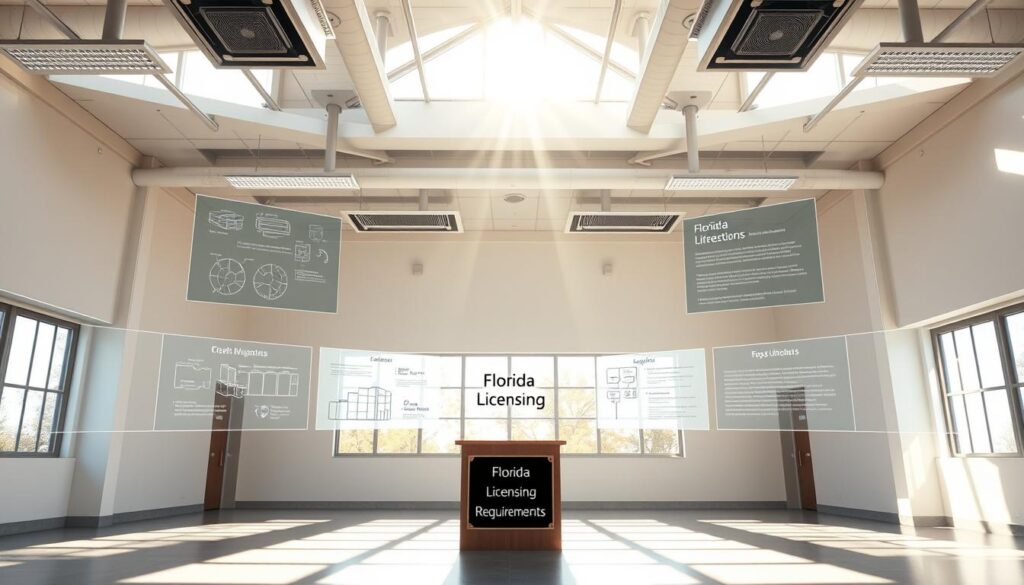Florida’s tropical climate makes heating and cooling systems essential for homes and businesses. With year-round heat and humidity, reliable climate control isn’t just a luxury—it’s a necessity. This demand fuels opportunities for skilled professionals in the HVAC industry. According to the U.S. Bureau of Labor Statistics, Florida employs over 37,370 technicians, with growth rates outpacing national averages.
But what does it take to join this thriving field? State regulations ensure technicians meet strict standards to protect public safety. The Florida Department of Business and Professional Regulation oversees licensing, requiring education, hands-on experience, and passing scores on certification exams. Whether installing new systems or repairing existing equipment, compliance with these rules is non-negotiable.
This article breaks down the process step by step. You’ll learn about the types of licenses available, required training programs, and how to prepare for state exams. We’ll also explore insurance requirements and how they impact contractors. By the end, you’ll have a clear roadmap to launch or advance your career in this high-demand industry.
Key Takeaways
- Florida’s climate drives consistent demand for HVAC services, creating stable job opportunities.
- State law mandates licensing to ensure technicians meet safety and competency standards.
- Three license types are available, each with distinct education and experience requirements.
- Applicants must pass a state-approved exam and provide proof of insurance.
- The Florida Department of Business and Professional Regulation handles all licensing processes.
Overview of Florida HVAC Licensing Requirements
Becoming a certified professional in climate control services involves navigating specific state protocols. Two agencies oversee the process: the Florida Department of Business and Professional Regulation (DBPR) and the Construction Industry Licensing Board (CILB). Together, they enforce standards that prioritize public safety and technical expertise.
Florida Regulatory Bodies and Standards
The CILB establishes guidelines for installing and repairing heating, ventilation, and air conditioning systems. Their rules apply to both residential and commercial projects. For example, contractors must follow building codes that address energy efficiency and equipment safety.
Key Criteria for HVAC Professionals
To qualify for licensure, applicants must meet these baseline requirements:
| Requirement | Details | Regulatory Body |
|---|---|---|
| Age | Minimum 18 years | DBPR |
| Education | High school diploma or GED | CILB |
| Work Experience | 4 years (2 with formal training) | CILB |
| Exams | Trade knowledge + Business law | DBPR |
Documented hands-on training is critical for approval. Aspiring technicians often complete apprenticeships or vocational programs to build their skills. These steps ensure contractors can handle complex installations while adhering to legal and safety mandates.
Do you need a hvac license in florida: State Licensing Requirements
Operating HVAC systems in Florida isn’t just about technical skills—it’s a legal responsibility. State laws require all contractors to hold valid credentials through the Department of Business and Professional Regulation. These rules prevent unqualified work that could endanger residents or damage property.

Essential Legal and Safety Mandates
Florida enforces strict criteria for HVAC professionals. Applicants must pass criminal background checks and maintain a minimum credit score of 660. These measures ensure trustworthiness and financial stability in high-stakes projects.
Safety protocols protect both workers and clients. Technicians must follow electrical codes and refrigerant handling guidelines. Proper ventilation installations and equipment calibration prevent fire hazards or air quality issues.
| Requirement | Details | Enforcement Agency |
|---|---|---|
| Criminal Check | No felony convictions in past 5 years | DBPR |
| Insurance | $300,000 general liability coverage | CILB |
| Credit Score | Minimum 660 for license approval | DBPR |
Documentation like proof of 4 years’ experience and completion of state-approved courses is mandatory. For example, installing commercial cooling systems or repairing gas-powered heaters requires verified expertise. Compliance isn’t optional—it’s the foundation of public safety and professional credibility.
Navigating HVAC Training Programs and Certification Exams
Building expertise in climate control technology starts with quality education. Florida offers multiple pathways to gain the skills needed for professional success. Let’s explore how to prepare for licensing exams and which credentials add value to your career.
Accredited HVAC Training Options
Technical schools and apprenticeships provide hands-on learning for aspiring technicians. Programs approved by the Florida Department of Education cover:
- System design principles
- Refrigerant management
- Electrical troubleshooting
Apprenticeships combine classroom instruction with paid fieldwork. Many employers partner with trade schools to fast-track candidates into full-time roles.
Licensing Exam Structure and Requirements
The state-administered test evaluates both technical knowledge and business acumen. Here’s what to expect:
| Exam Component | Question Count | Time Limit |
|---|---|---|
| Trade Knowledge | 75 multiple-choice | 210 minutes |
| Business & Finance | 45 open-book | 135 minutes |
Passing scores require 70% or higher. Study materials from the Construction Industry Licensing Board help candidates focus on critical topics like load calculations and ductwork design.
EPA Certification and Specialized Credentials
Handling refrigerants legally demands EPA Section 608 Certification. Four types exist based on equipment complexity:
- Type I: Small appliances
- Type II: High-pressure systems
- Type III: Low-pressure units
- Universal: All categories
Specializations in geothermal systems or smart HVAC technology make technicians more competitive. These credentials often lead to higher pay and leadership roles.
Financial, Insurance, and Legal Considerations for Florida HVAC Contractors

Financial preparedness separates successful contractors from those struggling to meet state standards. Meeting Florida’s criteria requires careful planning and understanding of risk management strategies.
General Liability and Workers’ Compensation Insurance
State law mandates $100,000 general liability coverage for property damage and bodily injury. This protects homeowners if installations cause structural issues or accidents. Contractors must also carry workers’ compensation insurance for employees. “Even solo operators should consider coverage—it shields personal assets from lawsuits,” advises a Tampa-based industry expert.
Credit Standards and Background Checks
A 660 credit score demonstrates fiscal responsibility to the DBPR. Applicants below this threshold must secure a surety bond or letter of credit. The state also reviews:
- Criminal history (no felonies in past 5 years)
- Outstanding liens or judgments
- Tax compliance status
Improving credit involves paying debts promptly and limiting credit inquiries. Many contractors use specialized accounting software to track expenses and streamline tax filings. These steps ensure faster license approvals and build client trust in your services.
Cost, Licensing Timeline, and Career Benefits in Florida
Investing in an HVAC career requires understanding both upfront costs and long-term rewards. Florida’s growing demand for climate control services creates opportunities for professionals who complete licensing requirements. Let’s break down expenses, timelines, and how credentials boost career growth.
Application Fees, Renewal Costs, and Licensing Timelines
State-certified contractors pay higher fees than registered professionals due to broader work permissions. Here’s a cost comparison:
| License Type | Initial Fee | Renewal (Every 2 Years) |
|---|---|---|
| Certified | $455 | $305 |
| Registered | $305 | $155 |
Exam registration adds $135-$200, depending on testing location. Most applicants receive board approval within 6-8 weeks after passing exams. Delays often occur if insurance documents or experience records need verification.
Earning Potential and Competitive Advantages
Licensed professionals earn 28% more on average than uncredentialed workers. Recent data shows:
- Technicians: $38,000-$62,000 annually
- Installation supervisors: $54,000-$78,000
- Contractors with state certification: Up to $92,000
Public projects and commercial upgrades often require state-certified status. One Orlando contractor noted, “Our license lets us bid on school district contracts—that’s 40% of our annual revenue.” Ongoing education and specialization in smart home systems further increase marketability.
Conclusion
Securing your future in Florida’s HVAC sector starts with meeting state standards. Proper credentials validate your expertise and commitment to safety, ensuring compliance with legal mandates. Technicians who complete approved training, pass certification exams, and maintain insurance gain access to high-demand projects across residential and commercial markets.
Licensed professionals enjoy clear advantages. Higher earning potential, priority for public contracts, and increased client trust set certified contractors apart. Staying updated on building codes and emerging technologies further strengthens career longevity.
Ready to take the next step? Explore accredited programs through the Florida Department of Education or connect with local trade associations for mentorship opportunities. Your path to a rewarding HVAC career begins with meeting these essential requirements.
